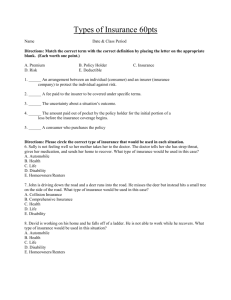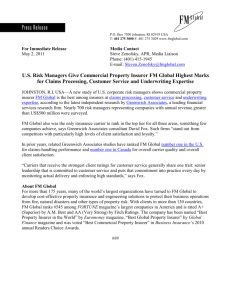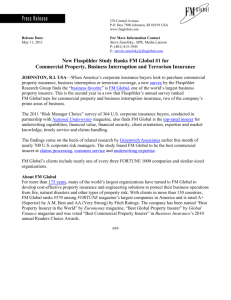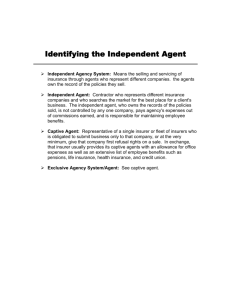COMMERCIAL LAW END OF SEMESTER EXAM
advertisement
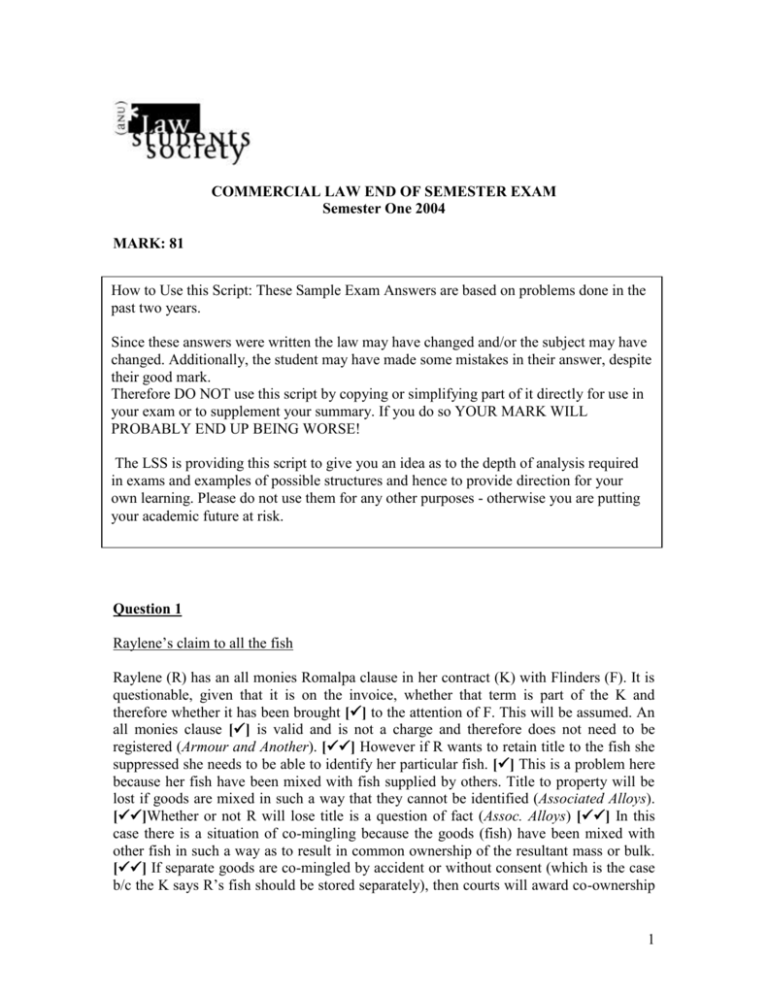
COMMERCIAL LAW END OF SEMESTER EXAM Semester One 2004 MARK: 81 How to Use this Script: These Sample Exam Answers are based on problems done in the past two years. Since these answers were written the law may have changed and/or the subject may have changed. Additionally, the student may have made some mistakes in their answer, despite their good mark. Therefore DO NOT use this script by copying or simplifying part of it directly for use in your exam or to supplement your summary. If you do so YOUR MARK WILL PROBABLY END UP BEING WORSE! The LSS is providing this script to give you an idea as to the depth of analysis required in exams and examples of possible structures and hence to provide direction for your own learning. Please do not use them for any other purposes - otherwise you are putting your academic future at risk. Question 1 Raylene’s claim to all the fish Raylene (R) has an all monies Romalpa clause in her contract (K) with Flinders (F). It is questionable, given that it is on the invoice, whether that term is part of the K and therefore whether it has been brought [] to the attention of F. This will be assumed. An all monies clause [] is valid and is not a charge and therefore does not need to be registered (Armour and Another). [] However if R wants to retain title to the fish she suppressed she needs to be able to identify her particular fish. [] This is a problem here because her fish have been mixed with fish supplied by others. Title to property will be lost if goods are mixed in such a way that they cannot be identified (Associated Alloys). []Whether or not R will lose title is a question of fact (Assoc. Alloys) [] In this case there is a situation of co-mingling because the goods (fish) have been mixed with other fish in such a way as to result in common ownership of the resultant mass or bulk. [] If separate goods are co-mingled by accident or without consent (which is the case b/c the K says R’s fish should be stored separately), then courts will award co-ownership 1 in accordance with the percentage [] value of input (Indian Oil). However R must be able to identify what percentage her fish are in the bulk product. This is unclear on the facts. [] Nevertheless, if she can she will retain title to that percentage. [] [Very good] Cl 2 However R not only claims title to the fish she supplied but also title to all the fish because under cl. 2 she says that if her fish are mixed with others, she will get title to all the fish. [] However, what cl 2 effectively creates is a mortgage because F have title to the fish, [] which they give to R, but F keeps possession, A mortgage is a charge for the purposes of the Corporations Law (s9) and therefore needs to be registered. [] Because it has not been registered, this renders cl 2 void as against the liquidator – s266. [] Thus R will only get title to the percentage of fish she proved which is in the bulk of the fish. [] Cash assets R’s K also provides for a trust over proceeds of sale. The High Court in Associated Alloys held that a trust over proceeds of sale is valid and is not a charge, [] therefore it doesn’t need to be registered. However a trust is only useful for R if the proceeds of sale of mixed products can be identified. [] In Assoc Alloys the trust money could not be identified [] because all money flowed back into the one income stream. [] Therefore R will only be able to have trust proceeds if F has the appropriate accounting structures set up to ensure proceeds from the sale of mixed goods flows back in a single income stream. [] [Excellent ROT discussion] Tracey The clause in the K with Tracey (T) effectively created a pledge which is contractual and consensual in nature. [] It gives F right to possession of the dogs until the satisfaction of the debt owed by T to F. (Note that this could be considered a lien but this is unlikely as lien’s are non-consensual) [] By putting a clause in the K, it is consensual. [] Even though the dogs were not given to F for the purpose of the pledge, this does not matter (ANZ Banking). Dogs can be a subject matter of a pledge because they are capable of being physically possessed. [] F must maintain the dogs and keep them safe. The law implies a right of sale into a contract, though this can be removed by the K. As nothing is mentioned in respect of sale of the dogs, F can sell the dogs. They do not have to go to court to get this right as it is a self-help remedy. [] However if F sell the dogs, they must appropriate the proceeds of the sale to T’s debt and must account to T for any surplus after the paying of the debt [] and if selling one dog would be enough to satisfy the debt, then they can only sell one dog and not all three (Odessa per Lord Morsey). [Great!] 2 Rare and expensive dog In regards to the sale of the dog, which had been effectively stolen b/c passed with bad cheque. J may argue that F breached the implied condition that a seller has a right to sell the goods (s17 SGA). SGA applies because there was a K for the sale of goods, whereby the seller (F) transferred property in the goods for a price (s6(1)). This is satisfied on the facts. These facts are analogous to those in Rowland v Divall, however that case concerned a chain of selling of a stolen car. John may seek to rescind the K with F on the basis of breach of the implied condition to sell and therefore may try to recover the purchaser price of the dog. [] F could argue that you need to be able to put the parties in the same position as the time of contracting and because that cannot happen, because the dog has been seized by the police, [] F only has to pay damages. However Rowland held that consideration was the promise for passage of title, which did not occur, and because there is therefore total failure of consideration, F has to pay John the full purchase price of the dog. [Well property passed to E under original K therefore E – seller with voidable title. If recision occurred then with buyer in possession] Tory and Dean’s claim Tory and Dean both claim the stock in trade under their charges. Whether will be able to get title to all the fish as R has a percentage ownership. It must be decided which interest gets priority because the winner takes all. Tory’s charge was created first and it is a registered floating charge over stock in trade. Dean has a subsequently created registered fixed charge over the stock in trade. [] For registrable charges, you use the Corps Law priority rules. A registered floating charge is postponed to a subsequently registered fixed charge which is created before the floating charge crystallises, [] unless the register contains details of a restriction in the floating charge on the creation of further charges over the same property (s279(2) and (3)). [] As there is no such restriction in the charge documents for Tory, Dean’s charge prevails because he has a registered fixed charge. [] However it also needs to be ascertained who takes priority over Tracey’s dogs under the ledge. [?] A pledge is not registrable under the Corps Law and therefore one needs to use the common law priority rules. Given that Dean’s charges were created earlier and are equitable and the pledge is legal and was created later, the applicable rule is therefore that the earlier legal interest will prevail unless the equities are unequal. There is no evidence of estoppel, fraud or gross negligence, therefore Deal will have priority over F in relation to the dogs. [ Dogs never belonged to PP – therefore the charge never settled on the dogs. In plan this was great!! Let down by SOGA discussion = clear s27/29(2) and priority – should have locked at Dean v Raylene (R wins – earlier legal) rather than D v T (Dean’s charge never fixed on Tracey’s dogs)] [23/30] 3 Question 2 Amazon (A) wants to know whether the goods have passed to him or not to decide whether or not he can get insurance of the stock lost in the fire. [] Although A is called an agent, he is not necessarily an agent, as agency is distinguished from sale and it appears that A is a distributing agent. International Harvester stated that just because someone is called a distributing agent, doesn’t mean they are an agent in terms of agency law. [] Risk prima facie passes with property (s25 SGA). However this can be excluded by evidence to the contrary. [] In the K between A and Swallows (S). It seems that risk passes [] to A as soon as the goods are held at A’s showroom. Therefore the persisting provisions do not help A as risk has already passed and A cannot rescind the K with S. [] Has property passed to A? Property passes when intended to pass (s22). If intention is clear from K or conduct, follow that intention [] but if it cannot be reasonably ascertained, need to use s23. IN this case there is discussion of when risk passes, but not property. [] [Good] Passing property not dependent upon possession or payment. Property passes at time of contracting if unconditional i.e. for specific goods in a deliverable state. [] Here have specific goods agreed on at time of contracting. Rule 4 not applic. B/c can never return. Goods that are on-sold Application of Rule 5. Rule 5 When bikes are sent to A – they are unconditionally appropriated to K with A by assent. Therefore property on floor is property of A. Property has passed. [but – rule one worked! Good effort. Did A get insurance as an agent of S?] [11.5/15] Question 3 The issues for M are breach of K and whether there is a misrep. 4 Building and contents The insurer may argue that it does not have to pay M because he breached his K with them. Firstly the nature of the clauses must be determined. The insurer wants…. Arguably this clause is not a continuing warranty. [] Interpretation of insurance contracts are to be carried out according to the principle of contra preferentem – ambiguities against the insurer. [] This statement could be analogous to the situation in Huddleston where the statement regarding a car was construed as a statement only about the insured’s statement of mind at the time it entered into the K. [] Arguably this is the case here, [] and the insured premises were probably in a reasonable condition etc… at the time the K was entered into and therefore the fact that the extinguisher was 3 months overdue for a service is not a breach of K. [] The insured further warrants This clause looks more like a continuing warranty because it says ‘will be maintained over’ the course of the course of the insurance K’. Arguably having an extinguisher 3 months overdue for a service is probably a breach, although safe system of ‘work’ could mean that employees carried out their tasks correctly and does not relate to extinguishers being replaced. Though this is unlikely. However the insurer cannot refuse to pay any money to the insured for breach of a continuing warranty, although the amount can be reduced if the insurer’s interest was prejudiced as a result of failing to replace the extinguisher (s54). [] It does depend on the terms of the insurance K and what the insurer was led to believe, [] however it is very likely that the insurer would have increased the premiums if it was aware that extinguishers were not replaced when necessary. [] This could be analogous to informing an insurer that there were deadlocks on all the doors and then later taking one off. Thus it is likely that the insurer was prejudiced and the amount can be reduced. However it is also arguable that the failure to replace the extinguisher caused the loss. [] If it was a small fire and M was able to properly extinguish it, maybe no damage would have been done. [] This would enable the insurer to refuse to pay the claim (s54(2)) as this act caused or at least contributed to the loss. [Very good] Misrep M’s statement that he gets asthma sometimes may be considered a misrepresentation because he suffered chronic asthma etc. There is a duty of utmost good faith which is codified in s13 ICA however for pre-contractual situations s26 which provides a statutory test [] for misrepresentation applies. [] It will not be a misrep if it was a mistake honestly but mistakenly held and it was a belief a reasonable person in the circumstances would have held (s26(1)) [] The onus is on the insured (Plasteel). Arguably, even if M did only think that he only could be considered to get asthma sometimes, it is unlikely 5 that a reasonable person in the circumstances would think so. [] But was the misrep material? Under s26(2) a misrep will be material if the person knew the representation to be relevant to the insurer’s decision to undertake the risk and if so on what terms, [] or a reasonable person in the circumstances would be expected to know. Onus is on the insurer (Plasteel). Arguably, the fact that the question is asked should at least alert a reasonable person of its relevance. Furthermore the fact that M works in a garage, [] where he is probably surrounded by fumes and gases would make a reasonable person know it was relevant to risk. [] There is a material misrep. However, it may be considered that the insurer should have looked into the situation further, if it can be considered on obviously incomplete answer (s27) [] and therefore there would be no misrep. This is likely. [] Remedies – Div 3 Part IV Under s28(1) a remedy will only be available to the insurer if the misrep affected their decision to insure (s28(1)). Arguably here, if the insurer knew about M’s condition they would not have had a K for the same terms and premiums [] and therefore a remedy is available – would have upped the premiums. [] Is the misrep fraudulent? If the misrep is fraudulent, the insurer can rescind the K. This is unclear, if M had an intention to deceive. If it can the insured may ask the court to exercise its discretion and stop insurer rescinding K. This will apply if insurer is prejudiced (Plasteel). The insurer would have upped the premium considerably if they had known – so they could have rescinded K. If not fraudulent, insurer can reduce the amount that would place insured in position they would have been had misrep not occurred (s28(2)). V. likely – can be reduced to nil (s28(3)). [] Issue of contribution (s76) [?] [Well, what can I say??] [13.5/15] 6
